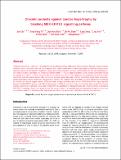| dc.contributor.author | Cai, Jun | en_US |
| dc.contributor.author | Yi, Fang-Fang | en_US |
| dc.contributor.author | Bian, Zhou-Yan | en_US |
| dc.contributor.author | Shen, Di-Fei | en_US |
| dc.contributor.author | Yang, Long | en_US |
| dc.contributor.author | Yan, Ling | en_US |
| dc.contributor.author | Tang, Qi-Zhu | en_US |
| dc.contributor.author | Yang, Xin-Chun | en_US |
| dc.contributor.author | Li, Hongliang | en_US |
| dc.date.accessioned | 2015-05-04T15:27:37Z | |
| dc.date.issued | 2009 | en_US |
| dc.identifier.citation | Cai, Jun, Fang-Fang Yi, Zhou-Yan Bian, Di-Fei Shen, Long Yang, Ling Yan, Qi-Zhu Tang, Xin-Chun Yang, and Hongliang Li. 2009. “Crocetin protects against cardiac hypertrophy by blocking MEK-ERK1/2 signalling pathway.” Journal of Cellular and Molecular Medicine 13 (5): 909-925. doi:10.1111/j.1582-4934.2008.00620.x. http://dx.doi.org/10.1111/j.1582-4934.2008.00620.x. | en |
| dc.identifier.issn | 1582-1838 | en |
| dc.identifier.uri | http://nrs.harvard.edu/urn-3:HUL.InstRepos:15034965 | |
| dc.description.abstract | Abstract Oxidative stress plays a critical role in the progression of pathological cardiac hypertrophy and heart failure. Because crocetin represses oxidative stress in vitro and in vivo, we have suggested that crocetin would repress cardiac hypertrophy by targeting oxidative stress-dependent signalling. We tested this hypothesis using primary cultured cardiac myocytes and fibroblasts and one well-established animal model of cardiac hypertrophy. The results showed that crocetin (1–10 μM) dose-dependently blocked cardiac hypertrophy induced by angiogensin II (Ang II; 1 μM) in vitro. Our data further revealed that crocetin (50 mg/kg/day) both prevented and reversed cardiac hypertrophy induced by aortic banding (AB), as assessed by heart weight/body weight and lung weight/body weight ratios, echocardio-graphic parameters and gene expression of hypertrophic markers. The inhibitory effect of crocetin on cardiac hypertrophy is mediated by blocking the reactive oxygen species (ROS)-dependent mitogen-activated protein kinase (MAPK)/extracellular signal-regulated kinase-1/2 (MEK/ERK1/2) pathway and GATA binding protein 4 (GATA-4) activation. Further investigation demonstrated that crocetin inhibited inflammation by blocking nuclear factor kappa B (NF-κB) signalling and attenuated fibrosis and collagen synthesis by abrogating MEK-ERK1/2 signalling. Overall, our results indicate that crocetin, which is a potentially safe and inexpensive therapy for clinical use, has protective potential in targeting cardiac hypertrophy and fibrosis by suppression of ROS-dependent signalling pathways. | en |
| dc.language.iso | en_US | en |
| dc.publisher | Blackwell Publishing Ltd | en |
| dc.relation.isversionof | doi:10.1111/j.1582-4934.2008.00620.x | en |
| dc.relation.hasversion | http://www.ncbi.nlm.nih.gov/pmc/articles/PMC3823407/pdf/ | en |
| dash.license | LAA | en_US |
| dc.subject | crocetin | en |
| dc.subject | reactive oxygen species | en |
| dc.subject | cardiac remodelling | en |
| dc.subject | fibrosis | en |
| dc.subject | NF-κB | en |
| dc.subject | ERK1/2 | en |
| dc.title | Crocetin protects against cardiac hypertrophy by blocking MEK-ERK1/2 signalling pathway | en |
| dc.type | Journal Article | en_US |
| dc.description.version | Version of Record | en |
| dc.relation.journal | Journal of Cellular and Molecular Medicine | en |
| dc.date.available | 2015-05-04T15:27:37Z | |
| dc.identifier.doi | 10.1111/j.1582-4934.2008.00620.x | * |
| dash.authorsordered | false | |


